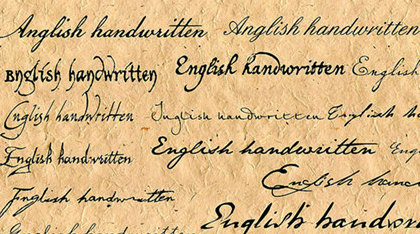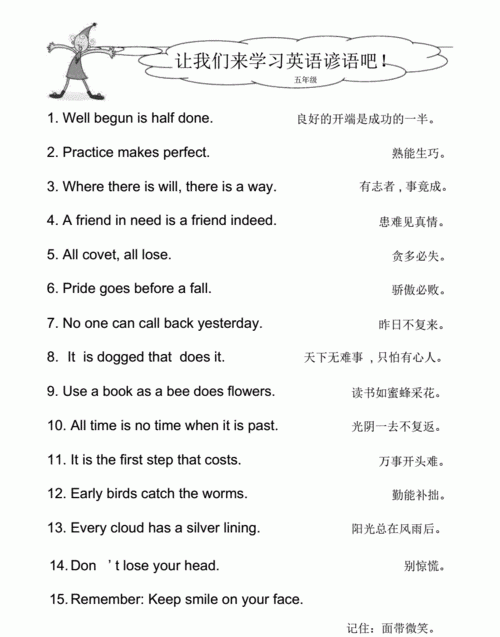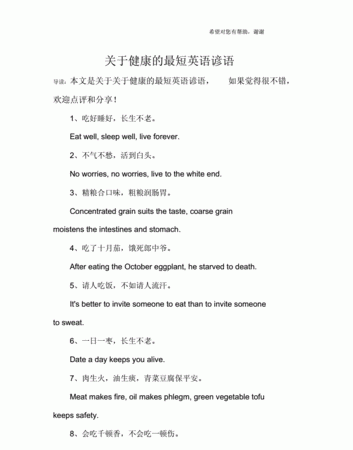本文目录
在英语中引用谚语的标准写法是什么意思
谚语在英语中叫proverb,引用时经常会在其前面酌情加上old, Chinese, English, Russian之类的形容词;动词一般用go, say, state, has it, put it等,在这些动词后面用逗号或冒号皆可。谚语可加双引号(这时谚语的第一个字母要大写),也可不加双引号(这时第一个字母一般不大写)。
例如:As a Spanish proverb has it, Flies dont enter a closed mouth.
正如一句西班牙谚语所说,祸从口入。

扩展资料
英语论文中引用一句句子的格式是:As an old saying goes+(引用的句子)。
引述别人的观点,可以直接引用,也可以间接引用。无论采用何种方式,论文作者必须注明所引文字的作者和出处。目前美国学术界通行的做法是在引文后以圆括弧形式注明引文作者及出处。如果英语论文中引用了同一作者的两篇或两篇以上的作品,除注明引文作者及页码外,还要注明作品名。
英语写作怎么引用谚语
导语:谚语是广泛流传于民间的言简意赅的`短语,多数反映了劳动人民的生活实践经验,而且一般都是经过口头传下来的。它多是口语形式的通俗易懂的短句或韵语。
中学生英语写作引用谚语大全:
Love is full of trouble.
爱情充满烦恼。
Love is never without jealousy.
没有妒忌就没有爱情。
Love me, love my dog.
爱屋及乌。
Make hay while the sun shines.
良机勿失。
Make your enemy your friend.
化敌为友。
Man is the soul of the universe.
人是万物之灵。
Man proposes, God disposes.
谋事在人,成事在天。
Many hands make light work.
众人拾柴火焰高。
Many heads are better than one.
三个臭皮匠,赛过诸葛亮。
Many things grow in the garden that were never sown there.
有心栽花花不发,无心插柳柳成荫。
Measure for measure.
针锋相对。
Misfortunes never come alone.
祸不单行。
Misfortune tests the sincerity of friends.
患难见真情。
Money isn't everything.
钱不是万能的。
Murder will out.
纸包不住火。
My son is my son till he has got him a wife, but my daughter is my daughter all the days of her life.
儿子婚前是儿子,女儿终生是女儿。
Nature is the true law.
天行有常,不为尧存,不为桀亡。
Necessity is the mother of invention.
需要是发明的动力。
Never fish in trouble water.
不要混水摸鱼。
Never judge from appearances.
不可以貌取人。
Never say die.
永不言败。
Never too old to learn, never too late to turn.
亡羊补牢,为时未晚。
New wine in old bottles.
旧瓶装新酒。
No cross, no crown.
不经历风雨,怎么见彩虹。
No garden without its weeds.
没有不长草的园子。
No living man all things can.
世上没有万事通。
No man can do two things at once.
一心不可二用。
No man is born wise or learned.
没有生而知之者。
No man is content.
人心不足蛇吞象。
No man is wise at all times.
聪明一世,糊涂一时。
None are so blind as those who won't see.
视而不见。
None are so deaf as those who won't hear.
充耳不闻。
No news is good news.
没有消息就是好消息。
No one can call back yesterday.
昨日不会重现。
No pains, no gains.
没有付出就没有收获。
No pleasure without pain.
没有苦就没有乐。
No rose without a thorn.
没有不带刺的玫瑰。
No sweet without sweat.
先苦后甜。
No smoke without fire.
无风不起浪。
Nothing brave, nothing have.
不入虎穴,焉得虎子。
Nothing dries sooner than a tear.
眼泪干得最快。
Nothing in the world is difficult for one who sets his mind to it.
世上无难事,只怕有心人。
Nothing is difficult to the man who will try.
世上无难事,只要肯登攀。
Nothing seek, nothing find.
没有追求就没有收获。
Nothing is so necessary for travelers as languages.
外出旅行,语言最要紧。
Nothing is to be got without pains but poverty.
世上唯有贫穷可以不劳而获。
Not to advance is to go back.
不进则退。
Not to know what happened before one was born is always to be a child.
不懂世故,幼稚可笑。
No way is impossible to courage.
勇者无惧。
Obedience is the first duty of a soldier.
军人以服从命令为天职。
Observation is the best teacher.
观察是最好的老师。
Offense is the best defense.
进攻是最好的防御。
Old friends and old wines are best.
陈酒味醇,老友情深。
Old sin makes new shame.
一失足成千古恨。
Once a man and twice a child.
一次老,两次小。
Once a thief, always a thief.
偷盗一次,做贼一世。
Once bitten, twice shy.
一朝被蛇咬,十年怕井绳。

英语作文中引出谚语的句子
蒽,这个问题我是下哈~!给你几个列子啊,{1}A prevrb says ,“you are only young once”(适用于已记住的名言){2}As everyone knows,No one can deny that···英语的系统学习,首要的是从英语的基础知识入手,全面系统地学习和复习。否则,基础知识的混乱将直接障碍着未来英语基本能力的灵活发挥。而在其基础知识的系统概念中,包含着下列不可回避的基本内容:
1.单词
2.词组
3.句型
4.时态
5.习惯
以上五项基础知识中,又以第五项“英语习惯用语”最易被学习者所忽略。而英语的习惯用语是英语语言发展过程中自发形成的带有本族文化特点的表达方式。英语习语的学习和运用则体现了学习者对英语语言文化的理解和把握,利于学习者英语思维方式的形成。
2009年元月,北京市教委在对09年中考的说明中,首次官方地将英语习语作为中考英语考核内容之一。为此,莱曼英语为广大学员收集整理了一些常用的英语习语,其中包括一部分谚语,歇后语,成语以及网络用语,仅供大家在学习中予以参考。
1. Where there is a will,there is a way.
有志者,事竟成。
2. There is no fire without smoke.
无风不起浪。事出有因。
3. No pain,no gain.
不劳动,不得食。
4. Never put all eggs into one basket.
不要将所有鸡蛋放在一个篮子里。
5. Every road leads to Rome.
条条大路通罗马。
6. Catch the hare,then cook it.
趁热打铁。
7. Actions speak louder than words.
行动胜于雄辩。
8. Each dog has its day.
每人都有出头那一天。
9. Every bean has its black.
每个人都有缺点。
10.A penny saved is a pennyearned.
积少成多。
11.Never do things by halves.
不要半途而废。
12.A friend in need is a friend indeed.
患难才能真朋友。
13.A man can be destroyed but not defeated.
一个人可以被消灭但不能被打跨。
14.Never put off till tomorrow what may be done today.
今日事,今日毕。
15.Nothing is impossible to a willing heart.
有智者,事能成。
16.Practice makes perfect.
熟能生巧。
17.Prepare for the worst and hope for the best.
最坏的准备,最好的希望。
18.Kill two birds with one stone.
一石二鸟。一箭双雕。
19.Make a long story short.
长话短说。
20.Big mouth!
多嘴!
21.God works!
上帝的安排!
22.It's a long story.
一言难尽
23.Watch your mouth.
注意言辞。
24.A thousand times no.
绝对办不到。绝不可能。
25.It is not a big deal.
没什么了不起的。
26.Don't take ill of me.
别生我的气。
27.A fall in the pit,a gain in your wit.
吃一堑,长一智。
28.An apple a day,keeps the doctor away.
一天一苹果,医生不找我。
29.A young idler,an old beggar.
少小不努力,老大徒伤悲。
30.Behind the mountains,there are people to be found.
山外有山,天外有天。
31.Bad luck often brings a good one.
塞翁失马,安知非福。
32.Don't try to teach fish to swim.
不要班门弄斧。
33.East or west,home is the best.
金窝银窝,不如自己的草窝。
34.One is never too old to learn.
活到老,学到老。
35.One swallow cannot make a summer.
一支独秀不是春。
36.Rome was not built up in a day.
罗马非一日建成。
37.Walls have ears.
隔墙有耳。
38.You cannot burn the candle at both ends.
鱼和熊掌不可兼得。

英语写作常用句型100句
英语写作常用引用句型
很多人把英语写做视为洪水猛兽,为了帮助大家,我分享了一些英语写做常用句型,希望能帮到大家!

英语写作引用句型
1. Some people think that …. 有些人认为…
To be frank, I can not agree with their opinion for the reasons below. 坦率地说,我不能同意他们的意见,理由如下。
2. For years, … has been seen as …, but things are quite different now.多年来,……一直被视为……,但今天的情况有很大的不同。
3. I believe the title statement is valid because…. 我认为这个论点是正确的,因为…
4. I cannot entirely agree with the idea that ….我无法完全同意这一观点的… I believe….
5. My argument for this view goes as follows.我对这个问题的看法如下。
6. Along with the development of…, more and more….随着……的发展,越来越多…
7. There is a long-running debate as to whether….有一个长期运行的辩论,是否…
8. It is commonly/generally/widely/ believed /held/accepted/recognized that….它通常是认为… 9. As far as I am concerned, I completely agree with the former/ the latter.就我而言,我完全同意前者/后者。
10. Before giving my opinion, I think it is essential to look at the argument of both sides.在给出我的观点之前,我想有必要看看双方的论据。
11. People's views on … vary from person to person. Some hold that …. However, others believe that….人们对……的观点因人而异.有些人认为……,然而其他人却认为……
12. People may have different opinions on …人们对……可能会有不同的见解.
13. Attitudes towards (drugs) vary from person to person.人们对待吸毒的态度因人而异.
14. There are different opinions among people as to …关于……,人们的观点大不相同.
15. Different people hold different attitudes toward (failure). 对(失败)人们的态度各不相同。
英语写作常用句型
1.There are several reasons for…, but in general, they come down to three major ones.有几个原因……,但一般,他们可以归结为三个主要的。
2.There are many factors that may account for…, but the following are the most typical ones.有许多因素可能占...,但以下是最典型的。
3.Many ways can contribute to solving this problem, but the following ones may be most effective.有很多方法可以解决这个问题,但下面的可能是最有效的。
4.Generally, the advantages can be listed as follows.一般来说,这些优势可以列举如下。
5.The reasons are as follows.
6.From my point of view, it is more reasonable to support the first opinion rather than the second. 在我看来,支持第一种观点比支持第二种观点更有道理.
7.I cannot entirely agree with the idea that …我无法完全同意这一观点……
8.Personally, I am standing on the side of …就个人而言,我站在……的一边.
9.As far as something is concerned, … 就某事而言,……
10.It was obvious that …很显然,….
11.It may be true that …, but it doesn't mean that …可能……是对的.,但这并不意味着……
12.It is natural to believe that …, but we shouldn't ignore that …认为……是很自然的,但我们不应忽视……
13.There is no evidence to suggest that … 没有证据表明……
14.I sincerely believe that …我真诚地相信……
15.This phenomenon exists for a number of reasons. First, … Second, … Third, …这一现象的存在是有许多原因的.首先,……;第二,,……;第三,……
16.Why did …? For one thing …,for another …. Perhaps the primary reason is…为什么会……?一个原因是……,令一个原因是……;或许其主要原因是……
17.Here are some suggestions for handling … 这是如何处理某事的一些建议.
18.The best way to solve the troubles is … 解决这些麻烦的最好办法是……
19.People have figured out many ways to solve this problem. 人们已找出许多办法来解决这个问题.
20.As far as …is concerned 就……而言
21.It goes without saying that… 不言而喻,…
22.It can be said with certainty that… 可以肯定地说……
23.As the proverb says, 正如谚语所说的,
24.It has to be noticed that… 它必须注意到,…
25.It's generally recognized that… 它普遍认为…
26.It's likely that … 这可能是因为…
27.It's hardly that… 这是很难的……
28.It's hardly too much to say that… 它几乎没有太多的说…
29.What calls for special attention is that…需要特别注意的是
30.There's no denying the fact that…毫无疑问,无可否认
31.Nothing is more important than the fact that… 没有什么比这更重要的是…
32.what's far more important is that… 更重要的是…
33.I will conclude by saying… 最后我要说…
34.Therefore, we have the reason to believe that…因此,我们有理由相信…
35.All things considered,总而言之 It may be safely said that…它可以有把握地说……
36.Therefore, in my opinion, it's more advisable…因此,在我看来,更可取的是…
37.From what has been discussed above, we may safely draw the conclusion that…通过以上讨论,我们可以得出结论…
38.The data/statistics/figures lead us to the conclusion that…通过数据我们得到的结论是,…
39.It can be concluded from the discussion that…从中我们可以得出这样的结论
40.From my point of view, it would be better if…在我看来……也许更好
;以上就是关于引用英语谚语的句式 ,在英语中引用谚语的标准写法是什么意思的全部内容,以及引用英语谚语的句式 的相关内容,希望能够帮到您。

